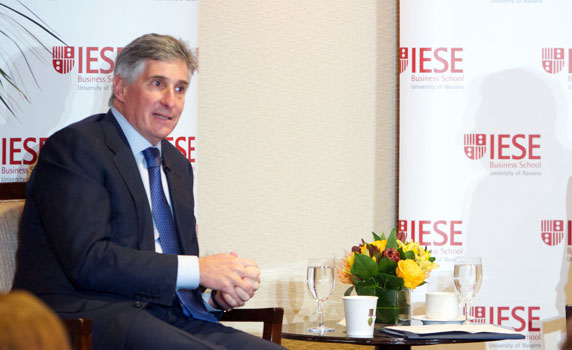
Paul J. Fribourg, chairman and CEO of Continental Grain Company shared a personal view of what drives success in family business with a capacity audience at IESE’s New York campus last night. In conversation with IESE Dean, Jordi Canals, and Distinguished Professor of Media Management, Dr. Bill Baker, he talked about the unique advantages the family business has in withstanding market volatility and striking a balance between family ownership and outside management.
As long as a company can survive the lows, he told participants, volatility should be welcomed. "You don’t want a flat average business because then you have very few opportunities."
Riding the Cycles
Continental has been in the agriculture business since 1813 when it was founded by Simon Fribourg in Arlon, Belgium. The cornerstone to Continental’s continuing success, he says, is its ability to ride the cycles in a volatile commodities market, which tends towards extremes.
Continental also has made significant acquisitions in the energy industry, which has seen prices fall by 25% in the last few months. Fribourg acknowledged there are challenges in planning out strategy and investments when prices rise and fall rapidly.
The Family Business Advantage: Building Relationships
Fribourg emphasized that privately owned companies and family businesses can tolerate greater volatility and focus on longer-range objectives because they are not constrained by quarter-to-quarter earnings. As a result, they have the breathing room to build long-term relationships.
He shared the example of Continental’s role as an American partner in 3G Capital’s acquisition of Burger King, Heinz; and more recently, the Canadian coffee chain Tim Hortons. The company’s involvement grew out relationships with the Brazilian backers of 3G Capital that dates back more than 35 years.
Relationships are also key, says Fribourg, to creating international business opportunities. In 1964 his father made the headlines by negotiating the first sale of wheat and rice to the Soviet Union. Continental went on to venture into China, driven by the belief that "by building relationships with people in burgeoning markets, you can achieve better political relationships." In global trade, he said, it’s not the politicians who create the real bridges, but the "interdependence of markets."
Balancing Family Ownership With Professional Management
Longevity, sustainability and the capacity to negotiate turbulence hinge, says Fribourg, on balancing private ownership with the right management team. He cited the example of Estee Lauder, of which he is a board member. "As a family business, they have put together a world-class outside, professional management team which includes the CEO." The result, he said, is that Estee Lauder has enjoyed a tremendous bump in market capitalization.
The commitment of shareholders is also critical, he added, in terms of weathering market cycles. "In today’s environment, any European public company’s business model can be turned upside down by economic and political uncertainties."
Business Ethics
Baker wondered how a multi-faceted business approaches ethical issues, such as GMOs in grain, antibiotics in chicken, and fair trade issues in the coffee business.
The future, Fribourg believes, is healthy food. To this end, Continental has begun ramping up efforts to drive the uptake of young entrepreneurs in the food industry. "It’s a big investment, but you ultimately end up with world-class management."
He also posits opportunities for professional growth as an equalizer in terms of income inequality – ahead of financial compensation. Burger King is doing a good job, he says, screening for high potential through quarterly evaluations of all employees, including hourly wage earners.
You Have to Earn Your Birthright
Quoting his lifelong friend, John Arnhold, Fribourg described dynastic expectations as a "burden but a privilege." A birthright, he said, is something that must be earned. "The worst thing you can do for the next generation is to give them a pile of cash – it will be spent or misinvested."
One of his own sons is interested in the business and, like his father, will have to "work his way up and see what he’s made of."